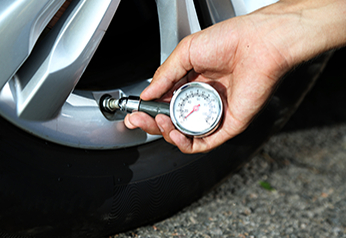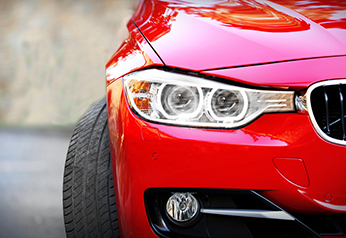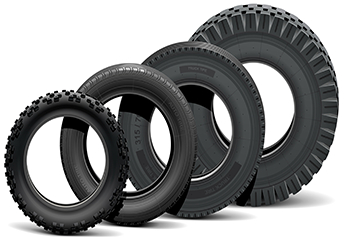
What's the Difference Between Steel and Alloy Wheels?
One of the best (but most overlooked) ways to upgrade your vehicle is to change its wheels.
They come in many different styles and various materials, the most popular being aluminium and steel.
What are wheels?
Wheels are what attaches your tyres to your car.
Their rotating motion makes your car move, and since they are in a vertical position underneath your vehicle, they also support the car's weight.
Why are wheels important?
Not only do the right set of wheels make your car look good, but they are also a vital part of how your vehicle operates.
1. They reduce friction between the ground and tyre
2. Wheels provide leverage to move your car forward
3. Your wheels also transmit the power of your engine to the ground.
4. All acceleration and braking capabilities are ultimately limited by the strength and precision of your wheels.
5. They directly support all your vehicle's weight, without any suspension or shocks. For the average passenger car, this means each wheel is supporting 1,000 lbs of mass.
Are rims and wheels the same thing?
Using the word "rims" when talking about your car's wheels is a commonly accepted practice, but, technically speaking, they are two different things.
The "wheel" is what you mount your tyre on so it can attach to your vehicle.
The "rim", on the other hand, is a part of the wheel, specifically where your tyre and wheel meet.
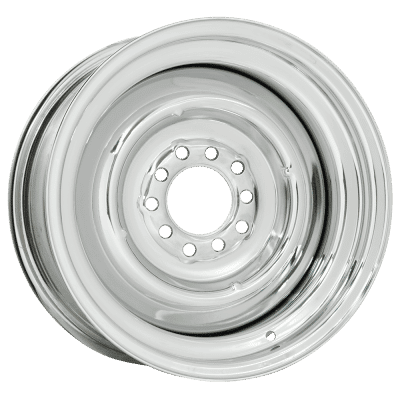
What Are Steel Wheels?
Steel wheels are made with a combination or alloy of iron and carbon.
They are the heaviest type of wheels but also the most durable.
You can also repair them quite quickly.
But they aren't as attractive and don't have as many customised wheel-spoke options available.
|
PROS |
CONS |
|
• Lower priced. • Long-lasting & durable. • Easy to repair. • Absorbs shocks and impacts. • More flexible under stressful conditions. • The choice for snow and winter, extreme off-road and heavy-duty driving. |
• Not as attractive as chrome and alloy wheels. • Limited looks and styles. • It can rust easily, especially in humid environments. • Delivers lower fuel efficiency due to its weight. • Not high-speed capable due to its weight. • Limited agility at higher speeds. • Not recommended for wheels larger than 16 inches in diameter. |
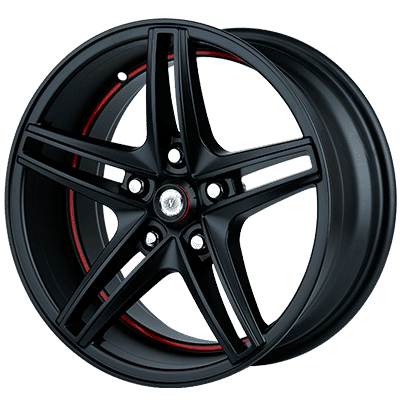
What Are Alloy Wheels?
Alloy wheels are typically made of aluminium combined with nickel, magnesium, and other metals and are cast or forged during the process. Aluminium is utilised for wheels because it offers a lightweight quality while balancing durability, strength, and cost.
|
PROS |
CONS |
|
• Much lighter (and buoyant) than other types of wheels. • Provides exceptional handling. • Protects your car brakes since alloy transfers heat more efficiently than steel or chrome. • It comes in a wide array of customisable looks and spoke styles, polishing, painting, and finishing. • They are recommended for wheels with larger diameters (16 inches and up). • It can satisfy your need for speed due to its lighter frame, making it easier on your suspension. • Perfect for high-performance sports cars and vehicles. |
• They are more expensive than steel wheels. • Not as durable as steel wheels. • Prone to cosmetic damages, cracks and fractures. • Not compatible with off-road and rocky terrain. |

Steel Vs. Alloy Wheels: Which should you choose?
Steel is a low-cost, long-lasting material that is ideal for no-nonsense driving applications. Steel wheels will keep your automobile on the road, function in all weather conditions, and be far more resistant to shocks, collisions, and stress than other materials. However, their heavier weight may reduce agility, acceleration, and fuel efficiency.
On the other hand, Alloy is better for nimble, high-performance driving, and it is also more customisable, making your ride more appealing and stylish.
Each type of wheel has its qualities, benefits, and of course, drawbacks.
Need Wheels?
Be it steel wheels or alloy wheels, make sure your wheels will match your individual needs as well as the type of vehicle you have.
Tyroola has a wide range of some of the world's best wheel brands available for you to choose from.
